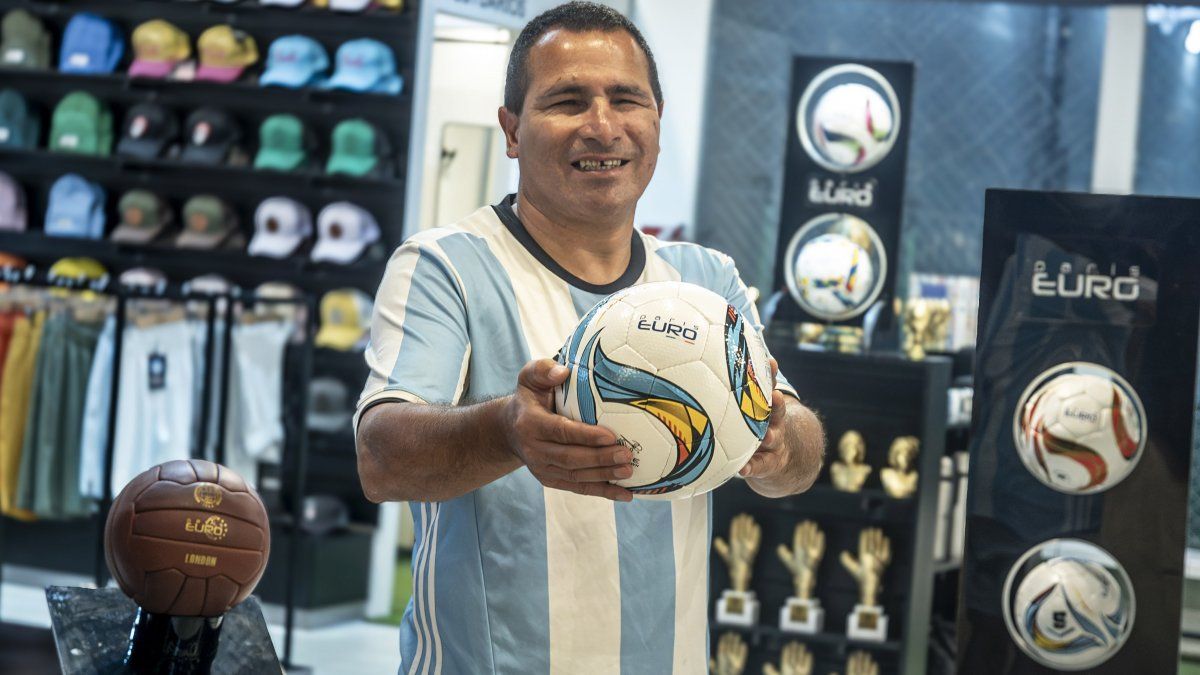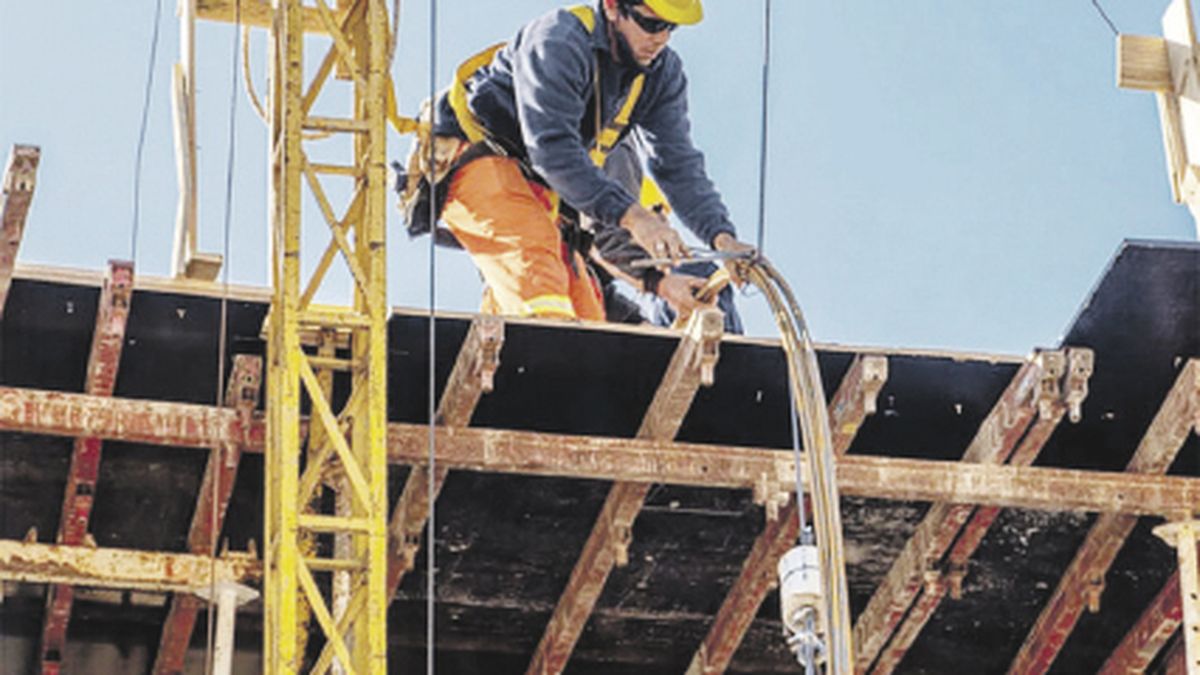He takes it out of the bag, inflates it and shows it. “She’s pretty, isn’t she?” she asks while she caresses the Europaris Silvio Velo with both hands.. It’s your ball. Nothing less. He immediately lowers it to the ground, he puts it under his sole and moves it quickly, back and forth, as if he had a defender in front of him. And as if he saw her… In reality, his thing goes further.
She feels. At her feet. And in her heart. “I was born blind and poor. And my only kid’s toy was the ball. From that day until today he is my great love.”. At 52 years old, after 30 years as captain of the Murciélagos, which included World Cups (2), Paralympic medals (3) and Copa América (2) won, in addition to five elections as the best player in the world, Silvio Velo reveals the importance that that round object has had in his life, as a vehicle for transformation. The true common thread of its existence. A relationship of pure love, the essence of an inspiring story of resilience that everyone should know.
Silvio was born in San Pedro, 164 kilometers from Capital Federal. In Las Canaletas, a poor and forgotten neighborhood. “We slept so close together that we all dreamed the same thing. Sometimes we got up to rest a little… As a child I lived in a private neighborhood… deprived of electricity, gas, everything,” he jokes. This is how Silvio begins the meeting. And it doesn’t stop. He cracks jokes one after the other, about his history and his condition of being blind. “Notice that my name is Sil-Vio Ve-lo”, he leaves as if passing by while giving a knowing smile.
Son of a bricklayer father and a housewife mother, Silvio was the fourth of 13 brothers who grew up on a mud ranch, riding a bike, going fishing, flying kites, playing hide and seek (“although I never found anyone”) and, above all, playing soccer, in the countryside. “There I didn’t touch a ball for five minutes, I couldn’t find it, but I didn’t care. I loved being there, experiencing that feeling of playing in the pasture. It was my place, I felt like I was born for that,” he recalls, excited, while he leaves a few lines to tell about his love for the ball. “It was my favorite toy, the only one that could be shared in the neighborhood. For me it meant a lot, living that passion was almost the only thing I had…” he admits.
At the age of 10, he left San Pedro to enter a specialized center for the blind, the Román Rosell Institute in San Isidro. Over there He went to primary school, learned braille, carpentry and electricity. But the main thing was that he began to develop as a player, starting with a discovery that changed his life. A homemade ball for the blind, with flattened soda bottles tied to the leather with a thread. “When I started listening to the ball it was like touching the sky with my hands… It was dangerous, sometimes it hit you and cut you. But I didn’t care. I was happy, it was like I had found a girlfriend who had always been elusive to me,” he recalls. He still has very much in mind what he felt at that moment. “That I was going to be able to fulfill my dream of being a player,” he acknowledges.
He quickly rose to fame, when at the age of 14 the popular magazine Semanario gave him a shout out. “He was the blind kid who loved soccer,” she remembers. She was 20 when he was summoned to the blind team to compete in the Pan American Games. A dream come true. “Yes, because I couldn’t see it but I wanted to play for my country,” he clarifies.
What came after, for three decades, surpassed everything imagined. Silvio won two World Cups, won three Paralympic medals and won two America’s Cups, among other milestones that include being, for five years, considered the best player in the world. His teammates and coaches used to say that he was capable of winning games on his own, like Diego in ’86. That’s why they called him the Maradona of the blind. And then they changed Messi, when La Pulga began to shine at Barcelona.
That’s why, in addition to winning, he left his legacy. “With Los Murciélagos we broke many barriers. At first, they looked at us and thought ‘poor little blind man, he plays soccer so he doesn’t stay at home.’ And as time went by they understood that this is a serious sport. When we started, no one knew us. We got tired of knocking on doors that wouldn’t open. But due to good results they opened up and today we are a respected team. And I feel enormous satisfaction for having contributed my grain of sand so that we begin to be seen as athletes and not as people who are doing therapy,” he reflects.
One of the doors that opened was that of Europaris, a national company that manufactures professional balls that is committed to quality and saw in Silvio a truly inspiring example. Ramiro Fabris, one of the owners of the brand, read the book “When there is a will, there are a thousand ways” and was captivated by the story. He wanted to meet Velo and that’s where the talks began to make a professional model for the blind that would bear his name. And his number, 5. This is how the Euro Silvio Velo was manufactured, which makes the Sampedrino feel proud. “It’s something beautiful, dreamed of… Imagine that I slept with a ball and now I have mine. It’s like closing a circle… Sometimes I arrive at a court and they are playing with my ball. It’s all very crazy. And very nice,” he says.
Silvio always wants more. In 2013 he was in a Telefé reality show, in 2018 he climbed Aconcagua with other personalities and has been giving talks for some time about attitude, leadership, teamwork, resilience and perseverance. And don’t even talk to him about retirement… Last year, at 51 years old, he played for the Rosell Institute that saw him grow up and was champion, scoring the goal of the penalty shootout against Huracán de Parque Patricios. He was also playing in the European Cup with San Remo. “I worked hard, age takes its toll on you but I have the experience, the job… I was able to compete,” he says while planning what’s next. “I never said I was going to leave, I was never going to feel like a former player. But I’m transitioning to another role, more of a driver. And looking for other horizons too, complete.
Recently, for example, he started tennis for the blind, taking classes every day and seeing where he can go. “I would like to be an international player,” she says without messing around. He is also about to present his second book and will begin filming a documentary about his life. For Silvio there are no impossible things. “I never renounced what I didn’t have but dedicated myself to enhancing what God gave me. Always, every day and in every stage of life, you have to give 100%. And I am at it, again, with the same passion as always,” he closes. An example of passion. Always with the ball under the sole. Now with your own.
Source: Ambito
I am Pierce Boyd, a driven and ambitious professional working in the news industry. I have been writing for 24 Hours Worlds for over five years, specializing in sports section coverage. During my tenure at the publication, I have built an impressive portfolio of articles that has earned me a reputation as an experienced journalist and content creator.




